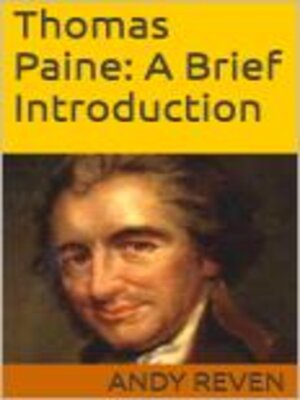
Sign up to save your library
With an OverDrive account, you can save your favorite libraries for at-a-glance information about availability. Find out more about OverDrive accounts.
Find this title in Libby, the library reading app by OverDrive.



Search for a digital library with this title
Title found at these libraries:
| Library Name | Distance |
|---|---|
| Loading... |
In this gripping new book, readers learn that Thomas Paine (1737-1809)
was an influential political philosopher, writer, and revolutionary whose ideas and writings played a pivotal role in the American Revolution and the promotion of democratic ideals. He was born on January 29, 1737, in Thetford, Norfolk, England, to a father who was a Quaker and a mother who was an Anglican.
Paine's early schooling was sporadic, and he worked in various jobs, including as an apprentice to his father, a stay-maker. In the early 1760s, he married a woman named Mary. In 1769, he immigrated to the American colonies, seeking better opportunities.
In 1776, he published the pamphlet "Common Sense," which presented a compelling argument for American independence from Britain. The pamphlet was widely read and influential, selling over 100,000 copies in a matter of months, and it helped galvanize public opinion for the revolutionary cause.
In addition to "Common Sense," Paine wrote a series of essays known as "The American Crisis," which inspired the Continental Army during the dark times of the war. His famous opening line, "These are the times that try men's souls," rallied Americans to continue fighting for independence.
He also held various political roles and was a staunch advocate for democracy and civil rights.
After the American Revolutionary War, Paine traveled to France, where he became involved in the French Revolution. He published "The Rights of Man" in 1791, a defense of the French Revolution and a critique of monarchy and hereditary government. His political activism, however, led him into trouble, and he was imprisoned for a time in France during the Reign of Terror.
In 1794, he returned to America, but his popularity had waned. His later writings, including "The Age of Reason," which advocated for deism and criticized organized religion, alienated many of his former supporters and contributed to his decline in public favor.







